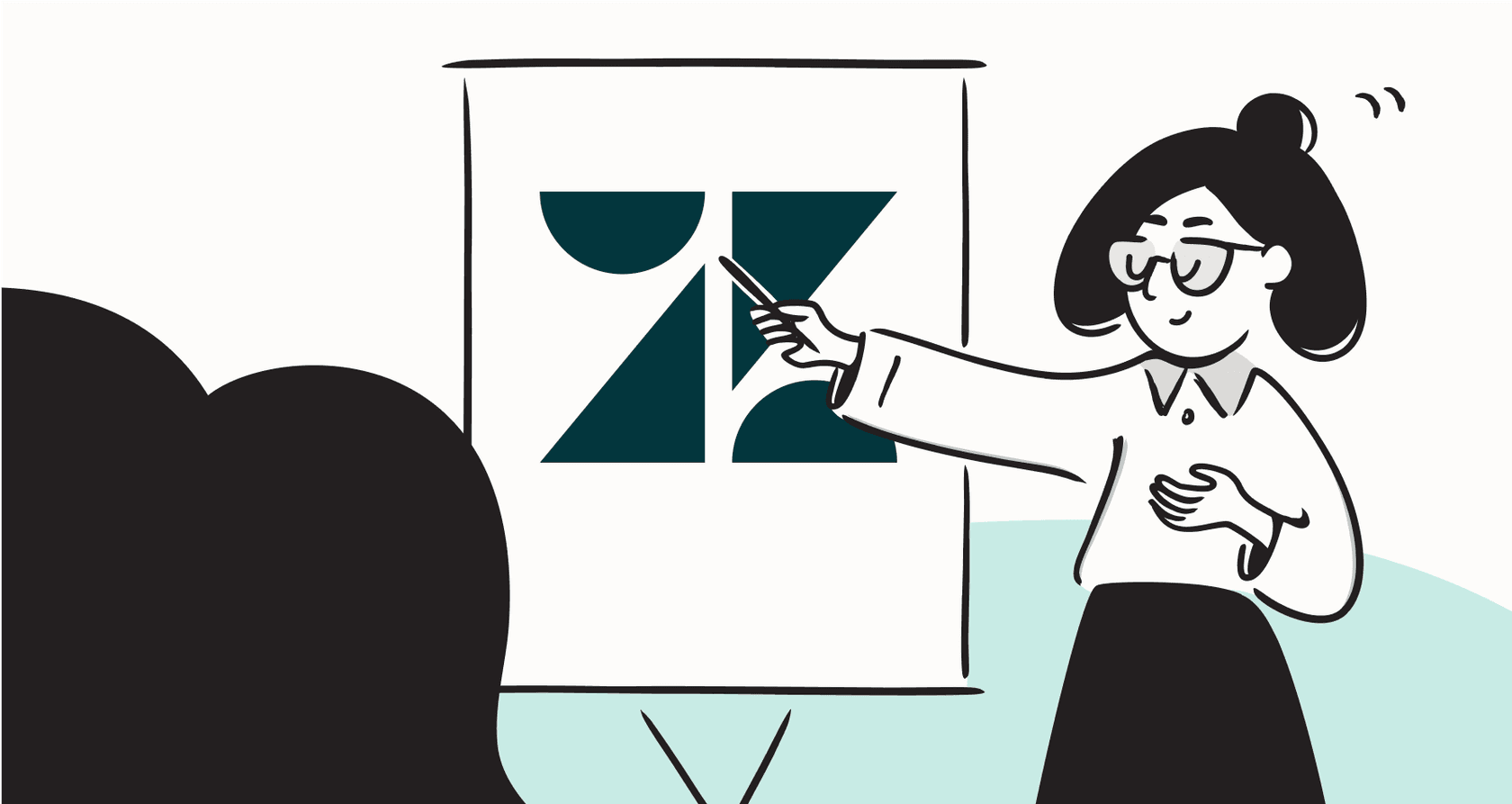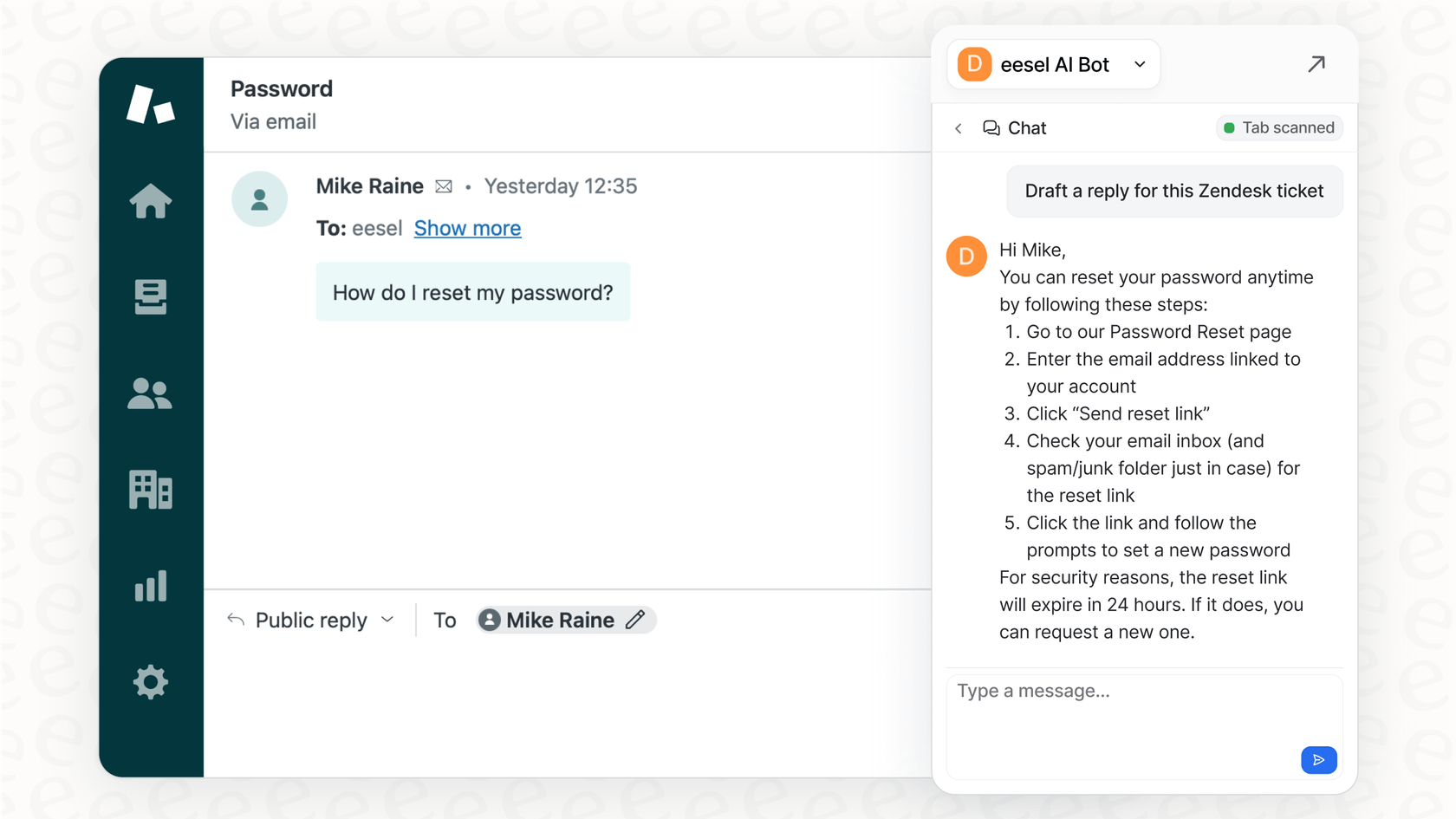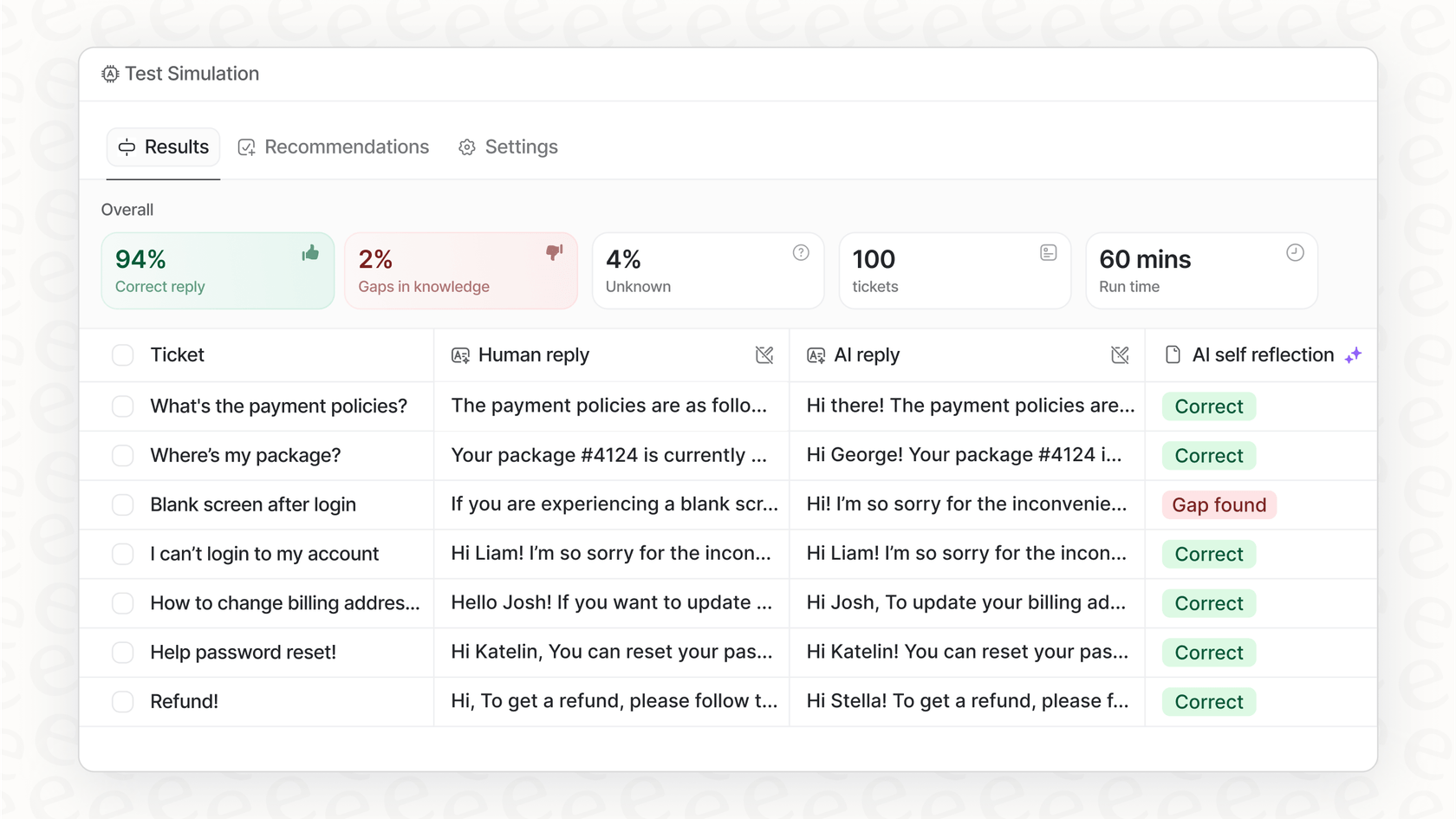Zendesk vs Zoho Desk: Which help desk is right for you in 2026?

Stevia Putri
Last edited January 12, 2026

Picking a new help desk feels like a major commitment, doesn't it? You're not just buying software; you're choosing the tool that will shape your team's day-to-day work and your customers' experience for a long time. Get it right, and you’ve got a happy, efficient team.
Two of the biggest names you'll run into are Zendesk and Zoho Desk. They both aim to streamline your support, but they come at it from different angles. Zendesk is the powerful, market-leading heavyweight that powers thousands of successful companies, while Zoho Desk is a nimble option that shines brightest inside its own ecosystem.
This guide will give you a straight-up comparison of their features, AI, pricing, and overall vibe so you can make a call you feel good about. We'll also look at a third option: what if you could add a layer of smart AI on top of the system you already have, instead of starting from scratch?
Zendesk vs Zoho Desk: what is Zendesk?
You've probably heard of Zendesk. It’s the industry leader in the customer service space, positioning itself as a mature, reliable, all-in-one solution for support departments of all sizes. At its heart, it’s a powerful ticketing system that efficiently manages customer conversations from email, chat, phone, social media, and more.
The whole platform is built around a robust ecosystem. You have Zendesk Support, which is the central hub for managing all your tickets. Then there’s Zendesk Guide for building out self-service knowledge bases, Zendesk Talk for handling phone calls right inside the app, and Zendesk Explore for diving deep into your performance data.
Zendesk is the gold standard for companies that need a platform that can handle a high volume of requests with enterprise-grade reliability and a massive marketplace of integrations.
Zendesk vs Zoho Desk: what is Zoho Desk?
Zoho Desk pitches itself as a "context-aware" help desk](https://www.zoho.com/desk/zendesk-alternative.html). Its main selling point is how it fits into the larger Zoho universe, which includes everything from a CRM to analytics tools. If your company is already using other Zoho products, adding Desk to the mix can be a convenient addition.
It’s designed to help agents see a customer's history. By pulling in information from Zoho CRM and other connected apps, your team can view customer details while handling tickets.
Like Zendesk, it offers omnichannel support, bringing tickets into one place. It also comes with Zia, Zoho’s own AI assistant, which can do things like sentiment analysis or ticket tagging. One of its features is Blueprint, a tool that lets you create visual workflows to guide agents through specific processes.
Zoho Desk is a popular choice for businesses that want a capable tool within the Zoho suite or for smaller teams looking for a budget-friendly starting point.
Zendesk vs Zoho Desk: feature deep dive
Alright, let's get into the details of how these two platforms compare in the areas that really matter: daily use, AI features, and how well they play with other tools.
User experience and ticket management
Zendesk has put a lot of effort into making its agent interface feel modern and efficient. The Agent Workspace is a unified screen where agents can handle conversations from different channels seamlessly. It's clean, responsive, and built for professional teams that deal with a ton of tickets every day. You can also set up sophisticated triggers and automations to route tickets exactly where they need to go. This power provides a professional-grade setup that scales effortlessly.
Zoho Desk, in contrast, focuses on structure and context within its suite. Its Work Modes let agents sort tickets by things like due dates, which helps with prioritization. The Blueprint feature is also useful for ensuring everyone follows the same steps for common issues. While the interface is functional, it follows a more traditional design compared to Zendesk's modern look. Its strength lies in how it surfaces data from other Zoho apps.
The eesel AI advantage: Both platforms have their own way of doing things. If you're looking for a complementary way to upgrade your agent's workflow without a massive training session, an AI Copilot like eesel AI plugs right into the help desk you already use. It helps agents draft better replies and find answers in seconds, working alongside the system you know.

AI and automation capabilities
Zendesk offers a world-class range of AI tools designed specifically for customer support, including intelligent triage that automatically sorts and routes incoming tickets. With the addition of Ultimate.ai to the Zendesk family, the platform now offers even more robust automation and multilingual capabilities. These AI agents are highly capable and designed to strengthen Zendesk's position as a market leader in AI-driven support.
Zoho Desk includes its AI assistant, Zia, in its higher paid plans. Zia can handle tasks like sentiment analysis and auto-tagging. It’s a handy assistant for teams already invested in the Zoho ecosystem, though its capabilities are often tied to how much you use other Zoho apps.
The eesel AI advantage: While built-in help desk AI is powerful, it often focuses on the data within the ticketing system. eesel AI acts as a complementary option by connecting to and learning from all your company's knowledge. With simple, one-click integrations for tools like Confluence, Google Docs, and Notion, it can pull information from internal wikis and spreadsheets to provide comprehensive answers from day one.

Customization and integrations
When it comes to connecting with other apps, Zendesk is an impressive leader. Its marketplace has over 1,700 apps, so you can connect your help desk to just about any other tool your business uses. This flexibility is a huge advantage for companies that want a highly tailored, scalable ecosystem.
Zoho Desk’s strength is its tight connection with the rest of the Zoho family. If your business runs on Zoho, the integration is very natural. Its marketplace for third-party apps is more curated than Zendesk's, and custom changes are typically handled through Zoho’s own scripting language, Deluge.
The eesel AI advantage: eesel AI offers a flexible path that enhances your existing tools. It plugs directly into your current help desk, whether it's Zendesk, Freshdesk, or something else. This lets you add powerful AI without a disruptive switch. You can even run simulations on past tickets to see how it performs, making it a low-risk way to bolster your support capabilities.

Zendesk vs Zoho Desk: pricing overview
Zendesk and Zoho Desk offer different pricing structures to match different team sizes and requirements.
Zendesk pricing
Zendesk offers tiered plans designed to match the needs of growing teams and large enterprises. These Suite plans provide a comprehensive set of tools for omnichannel service.
| Plan | Price (Billed Annually) | Key Features |
|---|---|---|
| Suite Team | $55 /agent/month | Ticketing, messaging & live chat, 1 help center, standard automations, 1000+ apps and integrations. |
| Suite Growth | $89 /agent/month | Everything in Team + customizable ticket layouts, up to 5 help centers, SLAs, 100 comment-only agents. |
| Suite Professional | $115 /agent/month | Everything in Growth + skills-based routing, advanced reporting, community forums, HIPAA compliance. |
| Suite Enterprise | $169 /agent/month | Everything in Professional + custom agent roles, sandbox environment for testing, advanced workflows, up to 300 help centers. |
Analysis: Zendesk is a premium, mature platform. While it represents a higher investment, the pricing reflects the depth of features, industry-leading reliability, and the massive ecosystem you gain access to.
Zoho Desk pricing
Zoho Desk offers accessible pricing options that appeal to smaller teams and those already using the Zoho suite.
| Plan | Price (Billed Annually) | Key Features |
|---|---|---|
| Free | $0 for up to 3 agents | Email ticketing, private knowledge base, macros, mobile apps. |
| Standard | $14 /user/month | Social & community channels, customer happiness ratings, public knowledge base, basic reporting. |
| Professional | $23 /user/month | Multi-department ticketing, telephony integration, SLAs with business hours, round-robin ticket assignment. |
| Enterprise | $40 /user/month | Live chat, Zia (AI assistant), multi-brand help center, guided conversations, custom functions. |
Analysis: Zoho Desk provides a budget-friendly entry point for teams with straightforward support needs. Its Enterprise plan includes Zia AI, offering a great value for companies primarily looking for cost-effective software.
See a full feature breakdown of Zoho Desk, Zendesk, and other platforms to help visualize the key differences discussed.
Zendesk vs Zoho Desk: making the right choice for your team
So, what's the verdict? The right platform depends on your company’s size, goals, and existing tech stack.
-
Choose Zendesk if: You want the industry's most trusted, powerful, and scalable platform. If you need a robust ecosystem that can grow with a large company and handle complex support needs with professional-grade tools, Zendesk is the clear market leader.
-
Choose Zoho Desk if: You're a smaller business looking for a budget-friendly starting point, or if you're already deeply integrated into the Zoho product suite and want to keep your tools under one roof.
Both platforms are strong contenders in the market. If you're looking for a way to enhance your current setup without a full migration, eesel AI is a great complementary option. It adds a customizable AI layer right on top of your current help desk, bringing all your scattered knowledge together and giving your agents a powerful tool to help them succeed in minutes.
See how it works by starting a free trial today.
Frequently asked questions
For growing businesses, Zendesk is a premium, powerful platform designed for high scalability and deep functionality, suiting teams that want a long-term, enterprise-grade solution. Zoho Desk offers accessible pricing and a robust feature set that integrates well if you're already in the Zoho ecosystem.
Zendesk offers sophisticated, industry-leading AI like intelligent triage and advanced automation through its acquisition of Ultimate.ai, providing deep multilingual and robust automation features. Zoho Desk includes its Zia AI assistant for general-purpose tasks like sentiment analysis and benefit from native Zoho app integration.
The choice depends on your needs. Zendesk offers tiered plans with premium features that reflect its position as a market leader, providing high value for teams requiring professional-grade tools. Zoho Desk is structured for budget-conscious teams, with an Enterprise plan that appeals to smaller operations.
Zendesk boasts a vast, world-class marketplace with over 1,700 apps for extensive third-party integrations, offering unmatched flexibility for custom setups. Zoho Desk shines with native integration across the Zoho suite, though its third-party marketplace is more specialized, and deep customization often requires Zoho’s Deluge language.
If your company already uses other Zoho products like Zoho CRM, choosing Zoho Desk offers native integration. Zendesk, meanwhile, remains the gold standard for omnichannel support and can be integrated deeply with any system through its robust API and marketplace, making it a reliable choice for diverse tech stacks.
Zendesk provides a modern, professional interface with extensive features that allow for deep customization, offering significant value for teams that want a tailored setup. Zoho Desk is generally considered accessible for those already familiar with the Zoho ecosystem, though some find its interface takes a more traditional approach.
Yes, rather than a full platform migration, an AI Copilot like eesel AI can integrate directly with your existing help desk (including Zendesk or Zoho Desk). It complements your current setup by enhancing agent workflows and knowledge retrieval, providing a smooth upgrade to your existing processes.
Share this post

Article by
Stevia Putri
Stevia Putri is a marketing generalist at eesel AI, where she helps turn powerful AI tools into stories that resonate. She’s driven by curiosity, clarity, and the human side of technology.






